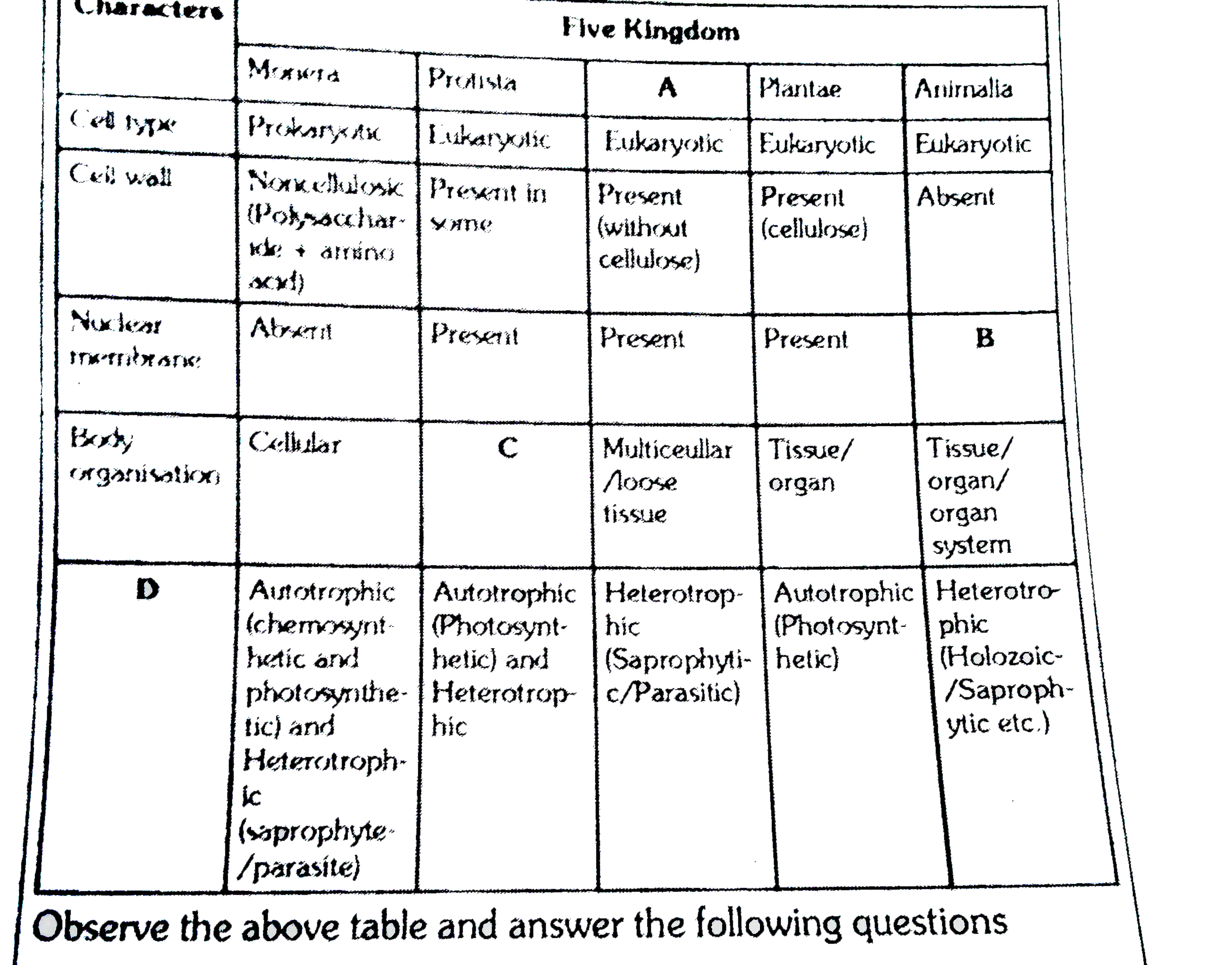In three kingdom classification, the kingdom Protista includes
(a) Unicellular eukaryotic organisms only
(b) Unicellular prokaryotic organisms only
(c) Wide variety of unicellular, mostly aquatic eukaryotes
(d) Wide variety of unicellular, mostly terrestrial Prokaryotes
Unicellular eukaryotic organisms only
Unicellular prokaryotic organisms only
Wide variety of unicellular, mostly aquatic eukaryotes
Wide variety of unicellular, mostly terrestrial Prokaryotes
The correct Answer is:C
Step-by-Step Solution:
1. Understanding Three Kingdom Classification: The three kingdom classification system was proposed by Ernst Haeckel and includes three main groups: Plantae, Animalia, and Protista.
2. Defining Kingdom Protista: The kingdom Protista is primarily composed of unicellular organisms. These organisms are eukaryotic, meaning they have a defined nucleus and organelles.
3. Nutritional Modes in Protista: Organisms in the Protista kingdom can exhibit various modes of nutrition. They can be autotrophic (producing their own food), heterotrophic (obtaining food from other sources), or mixotrophic (capable of both).
4. Analyzing the Options:
- (a) Unicellular eukaryotic organisms only: This is true as Protista includes unicellular eukaryotes.
- (b) Unicellular prokaryotic organisms only: This is incorrect since Protista consists of eukaryotic organisms, not prokaryotic.
- (c) Wide variety of unicellular, mostly aquatic eukaryotes: This is also true, but it is more specific than option (a).
- (d) Wide variety of unicellular, mostly terrestrial prokaryotes: This is incorrect as Protista does not include prokaryotes.
5. Conclusion: The best answer that encompasses the characteristics of the kingdom Protista is option (c) "Wide variety of unicellular, mostly aquatic eukaryotes," as it highlights the diversity and aquatic nature of many protists.
Final Answer: (c) Wide variety of unicellular, mostly aquatic eukaryotes.
---
- (a) Unicellular eukaryotic organisms only: This is true as Protista includes unicellular eukaryotes.
- (b) Unicellular prokaryotic organisms only: This is incorrect since Protista consists of eukaryotic organisms, not prokaryotic.
- (c) Wide variety of unicellular, mostly aquatic eukaryotes: This is also true, but it is more specific than option (a).
- (d) Wide variety of unicellular, mostly terrestrial prokaryotes: This is incorrect as Protista does not include prokaryotes.
Topper's Solved these Questions
- BIOLOGICAL CLASSIFICATIONBOOK - AAKASH INSTITUTE ENGLISHCHAPTER - BIOLOGICAL CLASSIFICATIONEXERCISE - Assignment (Section - A) Objective Type Questions
50 Videos
- BIOLOGICAL CLASSIFICATIONBOOK - AAKASH INSTITUTE ENGLISHCHAPTER - BIOLOGICAL CLASSIFICATIONEXERCISE - Assignment (Section - B) (Objective Type Questions)
35 Videos
- BIOLOGICAL CLASSIFICATIONBOOK - AAKASH INSTITUTE ENGLISHCHAPTER - BIOLOGICAL CLASSIFICATIONEXERCISE - Try Yourself
26 Videos
- BIODIVERSITY AND CONSERVATIONBOOK - AAKASH INSTITUTE ENGLISHCHAPTER - BIODIVERSITY AND CONSERVATIONEXERCISE - SECTION - D (Assertion-Reason Type Questions)
10 Videos
- BIOMOLECULESBOOK - AAKASH INSTITUTE ENGLISHCHAPTER - BIOMOLECULESEXERCISE - ASSIGNMENT (SECTION-D) Assertion-Reason Type Questions
10 Videos
Similar Questions
The unicellular eukaryotic organisms were placed in
View SolutionYeast is a unicellular eukaryote organisms which is included in
View SolutionName the kingdom under which all unicellular eukaryotes are included.
View SolutionName unicellular group of eukaryotic organisms which are neither plants nor animals.
View Solution
Q. In which kingdom unicellular, eukaryotic autotrophic organisms are placed?
View SolutionAll eukaryotic unicellular organisms belong to
View SolutionAll eukaryotic unicellular organisms belong to
View Solution$ Kingdom Monera includes the unicellular prokaryotic organisms.
! Eukaryotes are the organisms which have a eukaryotic nucleus and double membraned organelles.
View SolutionTo which group do the following belong to?
(i) Unicellular prokaryotes
(ii) Unicellular eukaryotes
View SolutionName the unicellular group of eukaryotic organisms which are neither plants and animals nor fungi.
View Solution
